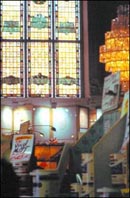| |

THE CRAIC (1998)
- buy this title from Amazon.co.uk


|
The idea of this journey round Ireland grew
from the attack on Canary Wharf in February 1996; and a realisation
that despite having grown up with 'the Troubles' in the newspapers,
and having Northern Irish roots myself, I understood precious
little about the reality of the situation. Bombs would go off
in London, you would hear the statements of supporting republicans
and outraged Government ministers and loyalists and get the
feeling you were reading a clichéd and lifeless script
for the thousandth time. This quarrel had been going on so long.
What on earth was it like on the ground?
Originally, my idea was to walk round Northern Ireland, meeting
and talking to people in the same way I had done in my previous
travel books. After discussions with my publisher, we decided
to broaden the canvas to take in the South too. I could also
attempt, I thought, to get to grips with the deeper background
of the ancient conflict, and explain, as I went, the broad lines
of Irish history to my British reader - for it was not a subject
we were taught in school. A straw poll among friends and acquaintances
had confirmed my suspicion that, like me, most people in the
UK had no absolutely no idea of even the outline of the Irish
story. (What happened in 1798? Who was Wolfe Tone? What did
O'Connell spend his life trying to do? And Emmet, Grattan, Davis
and Pearse? I rest my case.)
I followed the same plan as I'd done before. Follow your nose,
talk to whoever you meet, avoid preconceptions, build up your
picture in random fashion. So I was off, meeting and staying
with eccentric Ascendancy types in the South-East, moving on
to hear the point of view of teetotal IRA men in Cork, then
out to observe the summer invasion of Americans in Kerry, before
moving north to immerse myself in such delights as the Lisdoonvarna
Matchmaking Festival and the horse fair at Ballinasloe. Then
it was on through Donegal and into the altogether more serious
territory of the North.
| |
 |
| |
|
| |
Protestant church
converted into DIY centre, Dublin
|
| |
|
I met a man who'd been blinded by a rubber
bullet at the age of ten as he walked home from school. Just
a detail of a news story but for him a life sentence. Now nearly
forty, he ran a charity called Children of Crossfire. I met
another man who had lost two sons in the Troubles. One had been
run over by a British Army tank as he returned from a game of
football; outraged by his brother's death, the second had joined
the IRA, only to blow himself up with his own mortar bomb (see
second extract).
Deep in the green Antrim countryside I heard the sad stories
of the other side; how the Protestants were harassed in their
villages in a creeping and petty turf war. Here was a Protestant
family who habitually filled the bath around the Twelfth of
July, so that if a blazing rag came through the letterbox, 'you'll
not be waiting on the water filling'. Here were terrorists who
had taken up arms, they said, because they didn't trust the
police to defend them against the local nationalist elements.
'So what do you do?' they told me. 'If you've got a gun you
keep it for yourself and your own family. Who do you rely on?
Nobody but yourself. And then they ask, "Why do we exist?"'
Finally, worn out by politics, I arrived at the old family home
outside Armagh, where my great-great grandfather made a fortune
out of linen which his son squandered in Monte Carlo. Seventy
years later the house was falling down, but the family were
still remembered. The man living in the gatehouse took one look
at me and said, 'You're a McCrum, aren't you?' As with the best
non-fiction moments, you wouldn't have believed it if you'd
made it up.
I used the cliché 'craic' for the title because it seemed
to me a word that summed up the Ireland I'd seen. It's what
a lot of the inhabitants of this wet and windy country live
for, and it's a word that is used as much by Protestants as
Catholics. The craic can be as mighty at an Orange march as
it can at a fundraising do for the Ancient Order of Hibernians.
As one Belfast Protestant observed to me, 'To the Brits, we're
all Paddies.'
| |
 |
| |
|
| |
Fishermen, Inishmaan,
Aran Isles
|
| |
|
I left the country feeling that he was right;
the quarrel in the North was now more-than-ever an Irish quarrel,
and it would be healthier for all if the presence of Nanny (forever
trying to do the right thing in the guilty, post-colonial era)
were entirely removed.
Having seen the petty viciousness of the local vendettas, I
fully understood the insecurities of my relatives, the Northern
Irish Protestants. But being an outsider, I disagreed with them
about their fear of a united Ireland. Looked at on the map of
the world, Ireland is a tiny country. The border is as absurd
and arbitrary now as it was when it was created in 1921. Protestants
would have much to contribute to a single coherent country.
And who knows, some of those beautiful old Protestant churches
and cathedrals in the South (I'm thinking particularly of Tuam)
might find new worshippers. |
|

